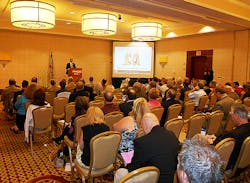Contractors victorious at PHCC Legislative Conference
WASHINGTON — Rep. Markwayne Mullin (R-OK) was cheered when he told members of Plumbing-Heating-Cooling Contractors – National Association meeting here that he is a plumber (Mullin Plumbing, Broken Arrow, Oklahoma). The reason he ran for Congress, Mullin told the plumbing contractors at their annual Legislative Conference in late May, was that he realized that the government was a bigger problem for his company than his competitors were.
The plumbing contractors were here, as they are every spring, to try to make government less of a problem for them.
In one of the all-time great similes, PHCC-National Director of Government Relations Mark Riso told the contractors that legislation vs. regulation is like ordering a cheeseburger. You might go off-menu with your order — change the cheese, add red onion, mayo on the side, onion rings instead of fries. Your cheeseburger order is legislation. Then it has to go to the kitchen, which is regulation. What comes out of the kitchen (or the Environmental Protection Agency or the Department of Energy) might be a lot different than what you ordered.
Riso gave the contractors a straightforward mission with just two components. Warm up the legislator or staffer with the information that PHCC-National is the country’s oldest trade association and give them the association’s new marketing brochure, “Best People, Best Practices.” Second, ask the legislator or staffer for help on two issues, getting the Perkins Act reauthorized and ask for help with regulatory agencies in getting industry a seat at the table when regulations are being written.
The Perkins Act
The Carl D. Perkins Career and Technical Education Act of 2006 is a grant program to the states that helps fund career and technical education, including plumbing and HVAC training programs. The Act supports career training for secondary and post-secondary education students who enroll in career and technical education (CTE). The reauthorization goals, as outlined by PHCC, include improving quality of CTE programs and increase innovation supported through reforms of state policies and practices. Currently, the Perkins Act is funded at $1.1 billion, a pittance in Washington terms.
The plumbing contractors who lobbied in the House and Senate office buildings in May were not asking Congress for anything specific on regulatory reform, Riso, instructed them. Rather, they were looking to pick up allies in Congress to push regulators into giving industry a voice in regulations. PHCC-National cited three regulatory efforts that had gone off the rails.
Regulatory wrongs
The first was the Lead Paint Renovation, Repair and Painting Rule. The rule initially made sense inasmuch as it served to protect small children from lead poisoning when it applied to old houses or daycare centers. EPA, however, has announced that it will expand the rule to commercial and government buildings, without legislative mandate or intent of Congress to expand it.
The second issue is DOE energy efficiency regulations for furnaces, air conditioners and heat pumps. DOE proposed creating regional efficiency standards, prompting a lawsuit by the industry and a new rulemaking process has been started for the regional standards provision.
The third regulation is the 2015 water heater rules that will require much higher energy factors for water heaters. Water heaters will be more expensive, homeowners will be angered, and some replacement installations might not even be physically possible if a heat pump water heater has to replace a lowboy electric in a closet or under a counter.
All three of those regulatory efforts would have been better if the industry had been allowed to participate and tell regulators what was practical and workable.
Thus given their charge from Riso, the contractors fanned out across Capital Hill where they met little resistance.
Something on which GOP, Dems agree
Terry McCarthy, president of Terry Plumbing, Chicago, told CONTRACTOR that the mostly Democratic lawmakers that his delegation met with were supportive of PHCC’s positions, including both Sens. Mark Kirk (the lone Republican) and Richard Durbin, as well as House members such as Dan Lipinski and Tammy Duckworth.
CONTRACTOR traveled with the Virginia delegation, led by PHCC-National Secretary Laurie Crigler, who heads new construction plumber L&D Associates Inc., Aroda, Va. All of the Virginia Republican Senators and Representatives favored PHCC positions. It was more a matter of who really “got it” and how enthusiastic they were.
One of the better ones was Karishma Merchant, legislative assistant to Sen. Tim Kaine, a former Virginia governor. The Senator has been pushing reauthorization of the Perkins Act, Merchant reported, and had already met with the Department of Education about it. Additionally, Kaine and Ohio Sen. Rob Portman had founded a vo-tech caucus, the Senate Career and Technical Education Caucus. The Kaine family has a welding background, Merchant said, the reason for the Senator’s interest in career education. Kaine is also co-sponsoring the Credit Act, S.2341, which will provide military tuition assistance for CTE.
Rep. Rob Wittman ushered the contractors into his office and told them that he is a big proponent of the Perkins Act and CTE in general. Wittman also told the contractors that he has introduced a bill calling for a sunset provision on any law that creates regulations. He sympathized with the contractors about the trend toward legalization of marijuana, and pointed out that employers have the right to prohibit legal substances, such as alcohol use on the job.
Rep. Robert Hurt also met personally with the contractors, and asked a lot of questions about CTE available through community colleges.
Chris Maneval, legislative assistant to Rep. Randy Forbes, told the contractors he knew exactly what they were talking about when it comes to impractical regulations promulgated without industry input. He had recently met with a manufacturer of cinderblocks who’s faced with silica dust regulations from the Occupational Safety & Health Administration that are so strict that it makes it next to impossible to make cinderblocks.
So the contractors’ lobbying efforts were seemingly met with success. Now it remains to be seen if that translates into legislative action.
